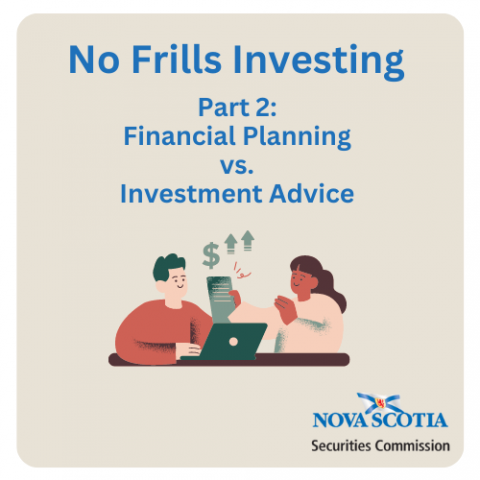Submitted by nsscadmin on

In Part 2 of our No Frills Investing series we’re looking at the difference between financial planning and investment advice.
As you may know, anyone who sells or advises on securities in the province of Nova Scotia must register with the Nova Scotia Securities Commission (NSSC). What you may not know is that someone calling themselves a “financial planner” may not need to register with the NSSC.
If someone calling themselves a financial planner in Nova Scotia does not offer investment advice or sell securities, they likely do not fall under the purview of the NSSC. Financial planning services are currently not regulated in Nova Scotia. So, if someone is offering to review your financial situation and provide you with things like a budget, a review of your monthly spending, savings goals and plans, they may not be subject to the extensive requirements that the NSSC imposes on registered individuals.
There are two generally known institutes offering financial planning training to individuals and that issue a certificate upon successful completion of their courses. The trademarked designations are (1) certified financial planner® with initials “CFP® and (2) Personal Financial Planner, designated as PFP®. Neither designation is accredited or endorsed by the NSSC, but each is indicative of an individual who has some training in financial planning. Others may also have such expertise.
Some financial planners provide a financial plan for a fee without any expectation of you purchasing securities or insurance through them. However, if a financial planner is also providing you with investment advice, or offering to sell you mutual funds, exchange-traded funds or other securities (other than insurance), they generally require registration with the NSSC.
An insurance salesperson can sell you investment products having an insurance component, such as individual variable insurance products (commonly called segregated funds). The people who sell them are regulated by the Nova Scotia Superintendent of Insurance and not by the NSSC.
We have talked about different types of registration of persons selling securities in this blog before, but here’s a basic rundown of what registration with the NSSC is and why the different categories matter.
The NSSC, like other securities regulators, registers an individual to provide investment advice and sell investment products only after that individual has demonstrated the required proficiency, integrity, and solvency. Their category of registration will determine what investment products they can legally advise on and sell. These categories include:
Click on each link to see our previous posts about these categories.
If you’re considering dealing with anyone who is providing you with financial advice, whether it be financial planning advice or investment advice, make sure you know who you’re dealing with, and that they have the necessary education, credentials, and experience to competently provide the services you are looking for. If the person is offering investment advice or selling securities, be sure to check their registration using the National Registration Search.
No Frills Investing Part 3: Mutual funds, Exchange-traded funds and shares.
